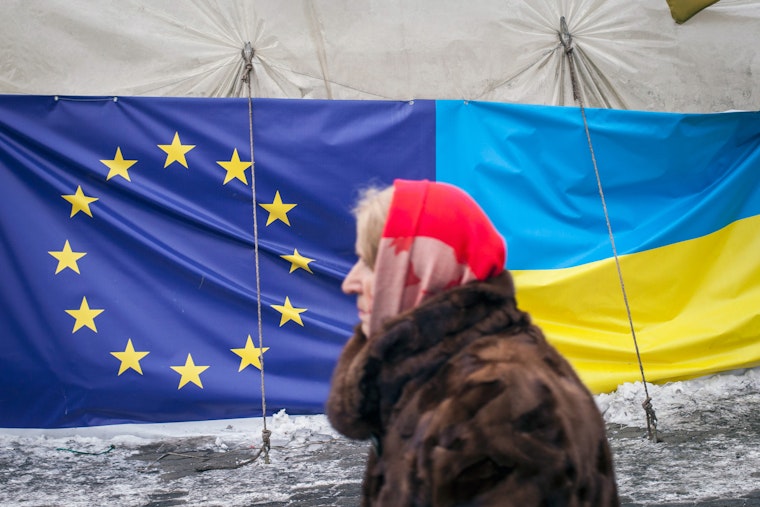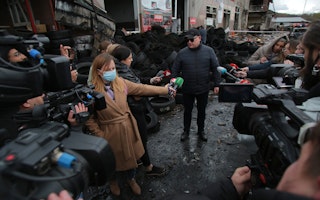In the EU, Media Portrayals of Ukraine Reveal Europe’s Own Self-Interests
By Graham Lee

Ukraine means different things to different people. In Russian, the word ukraina literally means “borderland” (or, less flatteringly to the Ukrainians, “outskirts.”) But for many Western European countries, Ukraine was peripheral to their interests prior to the outbreak of the current conflict.
As the Ukraine crisis enters its third year, the European media perspective of the conflict still centers on Russian foreign policy in its near abroad, and little else. The sheer power of Germany, France, Spain, Italy, and Greece to shape the EU position on Ukraine prompted us to look deeper into the discourses that inform the public opinion in these countries.
For many, their views are informed by Russian foreign policy. When the media debate on Ukraine does range beyond the role played by Russia, it typically focuses on other political issues transcending Ukraine itself: EU expansionism, U.S. influence in Europe, the European economy, or the rise of the far right. Often, the crisis is interpreted as a clash of interests and value systems fought between Russia and the West, with Ukraine serving primarily as a backdrop for unfolding events.
In fact, the Ukraine debate in these countries has focused more on how it affects their own citizens than Ukrainians themselves. Indeed, this debate is as much a reflection of the country in which the debate is taking place as it is a reflection of events on the ground in Ukraine—perhaps more so.
For instance, in Germany, opposition to Ukrainian self-determination is often linked to a fear of antagonizing Russia. Russia’s economic clout—particularly in the energy sector—and its military might incline many in German public life to adopt an understanding position towards the Kremlin’s engagement in Ukraine. Underpinning such an attitude is a zero-sum assumption: that Ukraine’s gain is Russia’s loss, and that Ukraine’s interests must be sacrificed in order to pacify Russia.
The French media debate on Ukraine, on the other hand, is informed by a palpable anti-American streak. Some in the country argue that the United States’ European policy is too forceful, trying to wrench Ukraine out of Russia’s legitimate sphere of influence. Faced with this intransigence, so the argument goes, Russia has little choice but to fight back. Looked at through this lens, support for Ukraine’s self-determination is linked to support for the United States itself—an unpopular position in France.
The same dynamic is present in Spain, where support for Ukraine is sometimes seen as support for the United States. In addition, some in Spain view support for Ukraine as an endorsement of another superpower about which they feel ambivalent: the European Union. Spaniards who feel positively towards the EU are likely to be sympathetic to Ukraine; those who feel negatively towards the EU, less so. And those who feel strongly either way about the cause of Catalan independence draw lessons from Russia’s annexation of Crimea, and the precedents which it sets for secessionist movements worldwide.
For Greece, bilateral relations with the EU eclipse the Ukraine crisis. Anti-EU sentiment is pervasive in Greece, which has suffered under austerity measures imposed by its neighbors, and Ukraine’s political migration towards Europe is viewed by many with disdain. Moreover, the specter of far-right politics and neo-fascism in Ukraine looms large for many Greeks. Ukraine has a significant ethnic Greek minority, and there is concern in the Greek media for this community’s future.
There is widespread suspicion in Italy, too, of the Ukrainian far right. And Italy has strong economic ties with Russia, as well as vested interests in military cooperation in the fight against Islamic extremism—both of which it fears could be jeopardized by support for Ukrainian self-determination. Sanctions against Russia are widely disapproved of in Italy, and support for Ukraine is perceived as coupled to the loss of a vital strategic partner.
Of course, these perspectives are part of an extremely complex and nuanced public debate taking place across an increasingly polarized continent. There are many in Germany, France, Spain, Greece, and Italy that view the current crisis in Ukraine as a fundamentally Ukrainian issue, and see that it is ordinary Ukrainians who have by far the most to win or lose through its resolution. But there are also many who do not, particularly in the higher echelons of political power, big business, and the mass media.
As the world faces up to another uncertain year, it is worth pausing a moment to think about Ukraine, and to consider what the ongoing conflict in the country really means. Is it a stalking horse for understanding geopolitics, a nexus of strategic interests that need to be balanced, or a country of citizens hopeful for a more peaceful and prosperous future? The answer lies in the eye of the beholder, and Ukraine’s future depends on it.
Graham Lee is a regional policy expert and partner of the Open Society European Policy Institute.


